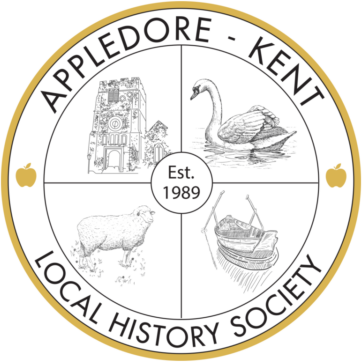Memories of The Street – Appledore 1942, 3 & 4
By Ken Percival
I remember the roads were very poor surfaced as thousands of lorries and tanks used them. All the main roads were just a thin layer of tar covered with a sprinkling of grit on a rough rubble foundation. After which they were patched up by a road gang arriving in a steam lorry towing an iron boiler on wheels with a coal fire beneath for melting the tar. The liquid tar was tapped out into a modified watering can , then poured out onto the patches that needed repair by a workman. Then sprinkled with a shovel full of grit. Often from a pile of it left at stages along the roads . This was a frequent job. With rough edge potholes piles squashed horse dung and leaves. The Street was no exception. Then during the war there were the military mobile phone systems where a soldier walking ahead of a column of troops on foot (also motorised columns motor bike), with a reel of wire over his shoulders unwinding as he went with one or more men behind him with poles like cloths props hooking the wire up onto any high projecting thing like tree branches gutters lamp posts etc that came to hand, so an officer on the move could connect his portable phone to the wire and talk to a commander way back at the rear of the column .
Of course no one came back to take them down so the street was decorated along its length drooping different coloured wires . These portable phones came in a strong wood and metal box which whey about 2 lbs each. I still have one and I would not want to carry it far!
Doodle bugs or flying bombs came over the street by the hundred. I was down at my father’s work at the camp one day, and watched one being attacked by one of our fighters it was over Appledore by then and it burst into flames like a beautiful firework it dive down to earth we all cheered! But we never thought about who might be underneath ! To us it was another of the twenty five we had seen on their way to London to be stopped from reaching its target. Sorry !
By then the village looked like everywhere else, piles of sandbags rotting and turning green with mildew. Houses badly in need of paint, some large houses having been taken over by the troops looking more like government offices. Fences missing and well overgrown hedges and garden shrubs.
By this time I travelled every weekday to school in Ashford via Appledore Station leaving at 6.50 am. One day I fell over cut my leg badly and missed my train. It’s not certain that it was that train but about then an enemy plane cannon shelled the train. The engine boiler exploded and brought the plane down, then the crippled engine stood in a siding at Lydd station for months, curved up at each end with only the centre two axles and wheels touching the rails.
